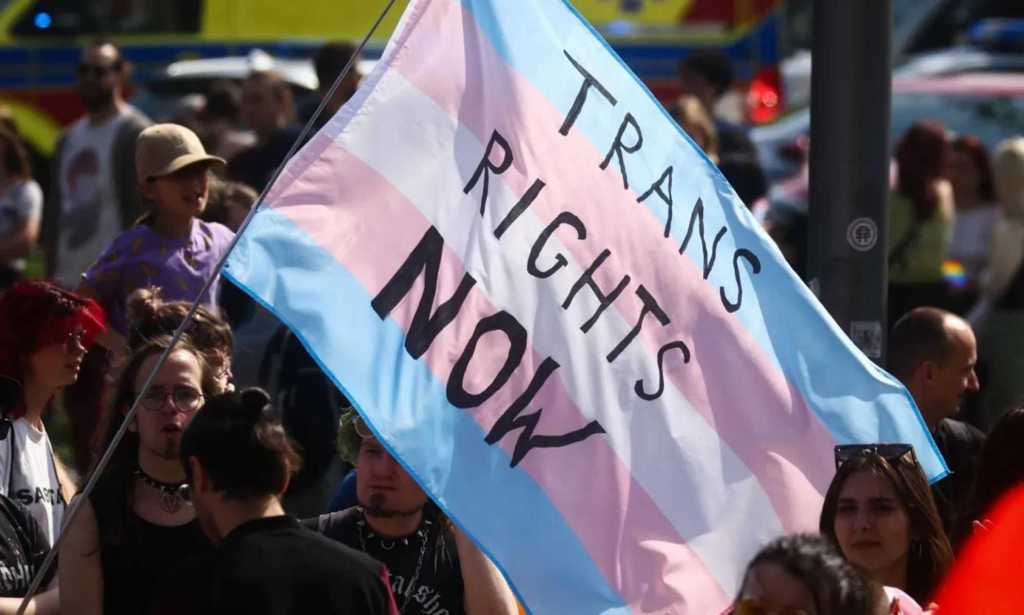Angela Rayner shares support for trans rights: ‘They are not in conflict with women’s rights’

Angela Rayner has asserted that trans rights and women’s rights are not in conflict. (USTIN TALLIS/AFP via Getty Images)
Labour deputy leader Angela Rayner has asserted that trans rights do not conflict with women’s rights, despite ongoing friction within Labour on trans issues and the party’s back-pedalling on long-held promises.
Speaking on BBC Radio 4’s Today programme, Rayner claimed Labour is still committed to creating a more “supportive process” to help people legally transition.
Her words come less than a month after the party announced it no longer supports self-ID and instead wishes to keep a “medical diagnosis of gender dysphoria” as part of the legal process for changing gender.
Labour leader Keir Starmer said at the time that a system which would allow people to self-ID is not the “right way forward”, citing “what happened in Scotland” as a justification.
This is a stark change to party policy of just three years ago, when Labour said it was “committed to equality” and fully supported “updating the GRA to introduce self-declaration for trans people”.
Labour’s shift in policy, announced via a column in The Guardian written by shadow women and equalities secretary Anneliese Dodds, broke a long-held promise by the party to the trans community.
It also puts the party at odds with Scottish Labour which backs self-ID and supported the SNP government’s landmark, demedicalised gender law reforms – which were subsequently quashed by Westminster.
“I still stand by they are not in conflict with women’s rights,” Rayner said during the BBC interview.
“We have talked about the Gender Recognition Act, we have talked about reform, we have talked about a process.
“Of course there has to be a process for people that is supportive and that is when you get into the weeds of how you ensure that we do have trans rights that are compatible and compassionate and humane.”
The deputy leader continued: “At the moment the process isn’t, and we have acknowledged that, that there are problems with the process, and therefore there has to be a process that is a supportive process that recognises that people can transition and that we do that in a way that is supportive of those people.”
She added: “But we have also, in the Equality Act that the Labour government introduced, had the safeguards within that for women-only spaces.
“That is absolutely appropriate and we have seen the conflict of what happens when those safeguards are not put in place.”

This is certainly not the first time Labour has presented contradictory and confusing stances on trans rights.
For many, Labour’s change in policy is not entirely unexpected.
In April 2023, GB News’ deputy political editor Tom Harwood shared a supposedly leaked copy of the Labour policy handbook which suggested Labour was “no longer committed to reforming the GRA to introduce self-ID”.
At the time, however, a senior Labour party figure told PinkNews it was still committed to self-ID but the internal “language has changed from ‘self-ID’ to ‘modernisation without medicalisation’”.
Increasingly, Labour has come under scrutiny from party members, LGBTQ+ activists and the wider public for its seemingly ever-changing stance on trans rights, with leader Sir Keir Starmer appearing to side with the Tories on more than one occasion on the issue.
In April, Starmer was blasted for comments had made in relation to biology, with some accusing him of “throwing trans people under the bus”.
In an interview with The Sunday Times, he said “For 99.9 per cent of women, it is completely biological … and of course they haven’t got a penis”.
In July, Starmer altered his stance again in response to being probed over the “penis question”, where he said a woman is an “adult female”.
How did this story make you feel?

